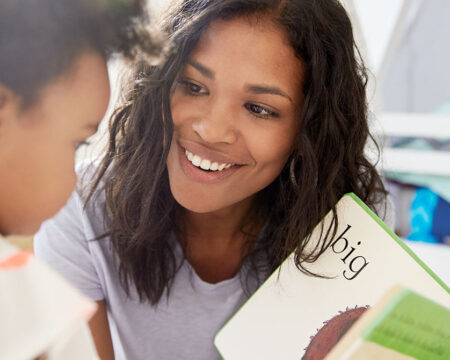Montessori at home: How to help your firstborn prepare for a new baby
As the final weeks go by and we near the arrival of our newest family member, I'm growing less anxious and more excited about how my toddler will react to being a big brother.

My son will be 27 months old when his baby sister is due. I’m under no delusions that I can ever fully prepare him for the changes that will bring. As a Montessori teacher of young children, I’ve seen many times how new siblings can completely rock a child’s world. New additions often bring big feelings and inconvenient regressions in things like toileting and sleep.
While I know nothing can truly prepare my son for all of this change, it certainly seems worthwhile to try.
Here are some Montessori-inspired ways I’ve been preparing my firstborn throughout my pregnancy.
1. Explain what will happen
In Montessori classrooms, we always inform children of changes to come. We tell them if we will be out of the classroom and they will have a different teacher or if there will be a special celebration that will disrupt their routine. This shows respect for the child and also addresses young children’s strong need for predictable routines.
We started talking to my son about his new baby sister as soon as the first trimester was over. I showed him the ultrasound pictures and talked about how the baby was growing inside of me right now, but he would get to meet her in a few months.
I’ve also talked to him about what will happen when the baby is actually born, like showing him the hospital where he will come meet his baby sister and he has even met the doctor who will deliver her. We explain who will take care of him while baby sister is being born. Telling your toddler early on, and including as much detail as possible, will help them emotionally prepare and feel included.
2. Follow their lead
“Follow the child” is a common phrase in Montessori, and one that describes the approach I’ve taken to talking to my son about his new sister. Since breaking the news, I’ve brought up the new baby often. Sometimes my son is interested and wants to talk about it, and sometimes he does not.
I make sure to follow his lead with these conversations. My goal is to present plenty of opportunities for him to ask questions, without forcing him to talk about it if he’s not ready to, or making him feel like the new baby is all we talk about.
As time has passed, he brings up “baby sister” more and more on his own. I always make sure to stop what I’m doing, make eye contact and be present for these conversations when he initiates them. Making yourself available to talk, without forcing the subject, lets your toddler know that he’s being heard and that is questions are welcomed.
3. Get them involved
In Montessori, children are involved in every part of daily life. This includes taking care of the classroom, preparing food for themselves and their classmates, and fixing things when they break. Involving my son in preparing for the new baby has been my favorite, and I think most effective, way of preparing him.
My toddler helped me put together a shelf for his sister’s closet. This was months ago and he still talks about it and likes to look at the shelf.
He helped to think of potential names for his new sibling— though his favorite was “Spee,” which I admit did not make the shortlist.
He helps me fold and put away her tiny laundry, choose what pictures to hang in her room, and has created art for her room by making a small painting we can frame on her toy shelf.
I also talk to him about the ways he can help after she is born, such as bringing me diapers, helping choose baby’s clothes, reading books and singing songs.
Helping in a real way make toddlers feel included and proud, and gives them a sense of purpose.
4. Set expectations
Part of helping young children be successful is setting clear expectations for appropriate behavior. We have talked a lot about the importance of being gentle with babies. We’ve practiced this by reminding my toddler that baby sister is in my belly and he needs to be gentle with me. We also practice doing other things, like closing doors and touching plants and animals, very gently.
It’s easy to forget that small children don’t always know the basic rules of society and sometimes all they need is for someone to patiently inform them and to practice together.
5. Use “time in”
The term “time in” refers to devoting extra time to just being with our children, reassuring them with our presence and attention that they are seen and loved.
I’ve tried to spend a little extra quality one-on-one time with my son these last few months. I want him to feel as confident and secure in our relationship as possible when the baby is born.
6. Encourage independent play time
On the flip side, I’ve also been working harder to encourage independent play time. Children in Montessori classrooms are highly independent, completing complex work on their own. This can be harder when you’re home with your child though, as it’s so easy to give them individual attention all day.
I’ve made a point recently of doing household tasks or simply reading a book while my son is playing. I make sure to do this after I’ve spent some time giving him my undivided attention.
I tell him, “You can help me or you can go play, but I can’t play right now.” This way, I’m not telling him to go away, but I am letting him know that I’m not always available to do what he wants right away.
Sometimes he helps me or sits with me, sometimes he plays on his own, and sometimes he whines and continually asks me to come play. It is a gradual process.
7. Look at pictures of babies
We’ve made my son’s baby book available to him and have spent countless hours looking through it. We talk about how tiny he was when he was born and how little he knew how to do and how he grew and can now do so many things.
We discuss how it will be the same with his baby sister, how she won’t be able to play with him at first, but she will grow and grow until she can do all of the things he likes to do like play Legos and run outside.
Spending time around friends’ or family members’ babies is also a wonderful way to help set realistic expectations for what a baby is actually like.
8. Use a Topponcino
A topponcino is a tiny mattress/pillow for babies that is commonly used in Montessori homes. It acts as a security object for infants, as it absorbs the parents’ smell and helps the baby feel safe when he is held by others.
It is also wonderful for allowing siblings to hold babies, with supervision of course, as it acts as a sturdy barrier between the two children. We have the topponcino out in the new baby’s room and practice holding it carefully, sometimes with a favorite stuffed animal on top.
As the final weeks go by and we near the arrival of our newest family member, I’m growing less anxious and more excited about how my toddler will react to being a big brother.
Yes, I know it will be hard and he will want my attention and I will feel guilty when I can’t give it to him. But I also trust him that he will process the changes and learn to treasure his little sister and I trust myself that I’ve done everything I can to prepare him.


